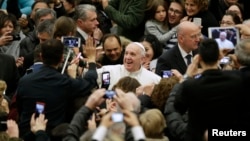Pope Francis told members of the world's wealthy political and economic elite on Wednesday that they should not be deaf to the cry of the poor and must consider their own role in creating inequality.
New technologies such as robotics must also not be allowed to replace humans with "soulless machines," he said in a message to the World Economic Forum in Davos. "To all of you I appeal once more: 'Do not forget the poor!'", he said.
The pope, who wrote a major encyclical on climate change and protection of the environment last year, also urged business leaders to see to it that the planet does not become "an empty garden."
The annual Davos meeting brings together many of the world's wealthiest and most powerful people to consider issues such as economics, climate change and war, with an eye to working on solutions to them.
It has been criticized by anti-globalization activists and others, however, as a forum for organizations that have been responsible for the problems in the first place. They are boosted by reports such as one from charity Oxfam estimating that 1 percent of the world's population owns 99 percent of the wealth.
Francis, who has made the defense of the poor a hallmark of his papacy and has in the past called money "the dung of the devil," said businesses and wealthy societies must acknowledge their role in creating poverty.
"Weeping for other people's pain does not only mean sharing in their sufferings, but also and above all realizing that our own actions are a cause of injustice and inequality," he said in the text of a message read for him by a top Vatican cardinal.
"Once we realize this, we become more fully human, since responsibility for our brothers and sisters is an essential part of our common humanity," he said. "Do not be afraid to open your minds and hearts to the poor. In this way, you will give free rein to your economic and technical talents, and discover the happiness of a full life, which consumerism of itself cannot provide."
Francis, the first pope from the global south, has in the past excoriated unbridled capitalism, calling for the redistribution of wealth and for economic policies that put people above profits, positions that have prompted criticism
from economic leaders.
"We must never allow the culture of prosperity to deaden us, to make us incapable of feeling compassion at the outcry of the poor, weeping for other people's pain, and sensing the need to help them, as though all this were someone else's responsibility and not our own," he said in the message read by Cardinal Peter Turkson of Ghana, the Vatican's justice minister.
Robots
Francis addressed the theme of this year's Davos meeting, "Mastering the Fourth Industrial Revolution," in which digital technology, artificial intelligence robotics and autonomous vehicles are expected to become ubiquitous in developed economies.
"In the face of profound and epochal changes, world leaders are challenged to ensure that the coming 'fourth industrial revolution', the result of robotics and scientific and technological innovations, does not lead to the destruction of
the human person — to be replaced by a soulless machine," he said.
Business and economic leaders had a duty to prevent "the transformation of our planet into an empty garden for the enjoyment of a chosen few."
"I urge you, then, to take up anew your conversation on how to build the future of the planet, 'our common home', and I ask you to make a united effort to pursue a sustainable and integral development," he said.





